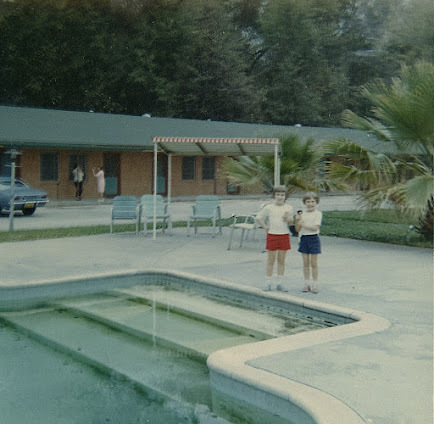Warmth One Winter

Journey of our Journeys
Chapter 6 - Warmth One Winter
Shortlyafter my parents married in 1945, my dad got a job at the Owens-Illinois papermill. At the time, it was by far the best place to work in our town. The paywas good, and the work was steady, even if it was noisy and smelly.
Dad worked in the maintenance department, so he wasn’t stuck with the swingshift like many others. Instead, he clocked in from 7:30 a.m. to 4:00 p.m.,Monday through Friday. He did have to take call, though, so he would go intowork in the middle of the night or on weekends if a piece of machinery neededemergency care.
This also meant that if needed, he would travel across the country to one ofthe other mills owned by Owens-Illinois.
Years before I was a twinkle in his eye, my father worked for an extendedperiod of time at the Valdosta, Georgia, mill. Mom, Tom, and Judy went withhim, living in company housing and dealing with the joys of submitting theirnorthern-born bodies to the hot, humid, bug- and snake-infested south.
Near the end of October 1967, Dad and some of the guys from his crew wereneeded at the mill in Orange, Texas. What a paper mill was doing there, alongthe Gulf of Mexico, was a mystery to me – and still is. Isn’t Texas a stateknown for ranches and wide-open spaces? Where do the trees that are needed tomake paper come from?
In any event, Dad took the camper to Texas with Tom Allory, Red Wurl, and a fewothers. When they got to Portage, Wisconsin, Dad took a wrong turn. Instead ofcrossing the Wisconsin River at the new Highway 51 bridge, he took the Merrimacferry. Although there are 1,200 miles of dry land between home and Orange, wewould always mention how Dad took the ferry there.
At some point during his absence, Mom packed up Pat, me, a lady named Mrs.Lane, and two young men in the military and drove to Texas for a few weeks. Forsome reason, we left at four o’clock in the morning. It was pitch black outsideand freezing cold that November.
We arrived in Texas the next day to a warmth we never dreamed of in November.We were amazed that we could go outside without jackets or scarves. The motelwhere we stayed had an outdoor pool, which was still in use. Of course, Momwouldn’t let us use it, but no decent mother of the time would let theirchildren go swimming outdoors in November, no matter what the weather or whereyou were.
Our jaunt to the Gulf of Mexico was rather chilly, more seasonable for us, witha stiff breeze coming off the ocean. Mom made us wear our jackets and scarves.Our plaid cotton scarves, with fringes, were almost extensions of ourselves, tobe worn at all times unless the weather was extreme. Extreme cold was what wehad left behind in Wisconsin that November, requiring a home-knit cap pulleddown around our ears. Extreme heat was the month of July, those four weeksduring the Wisconsin summer when the temperature consistently stayed above 45degrees.
Two of the souvenirs we brought home were silky scarves with a picture of theLone Star State printed on them. Pat’s had blue trim, mine red. Mine is stillat the bottom of one of my dresser drawers, threadbare and wrinkled, but stillbearing the Texas logo.
The other item I remember Mom purchasing was a play cowboy whip for my16-year-old cousin. I cannot fathom why she thought that was an appropriategift. As soon as she gave it to him, he chased Pat and me around my aunt’s yardwith it.
Free souvenirs are sometimes the best. Dozens of seashells found their way intothe camper only after Mom had inspected them to ensure no animals were lurkinginside.
“You know that animals do live inside those shells, don’t you?”
“Yes, Mom,” we obediently answered and immediately thought, “Wouldn’t it becool if one of those animals made it all the way home before crawling out whenwe took the shell to school for show-and-tell?”
We really wanted to take the jellyfish to school. We found one washed up on thebeach, its long transparent tentacles trailing into the ocean. It waspositively unearthly.
“Get away from that thing,” Mom shouted before we could get within ten yards.“That thing is poisonous.”
“But Mom, it’s dead.”
“It doesn’t matter. It is still poisonous and can still sting you.”
So much for extraordinary wildlife.
Dad packed us up in early December, and we headed home together in the camper,stopping at the Astrodome on the way. It was the eighth wonder of the world atthe time, a mechanical feat of engineering ingenuity. Opened in April 1965, itwas still new when we visited it two years later. And for many years, it wasone of a kind—a structure to rival the pyramids of Giza. Even the Astroturf wasawe-inspiring. Over the last twenty years or so, the space had become archaic and fell into disrepair.
The only thing good about returning home to the frozen tundra was that I got toshow off all sorts of neat stuff to my kindergarten class.



